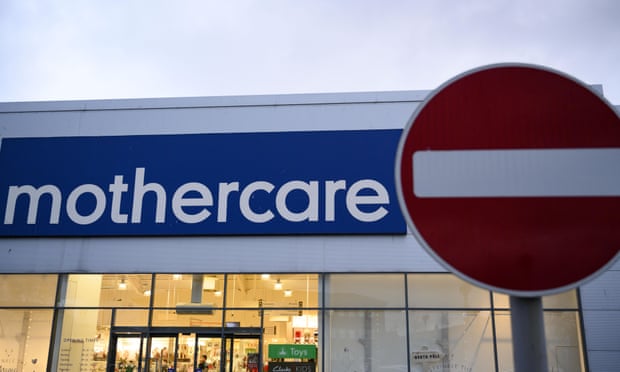Reform business rates or risk a high street collapse, say firms
The leaders of household names including Tesco, B&Q and Waterstones have warned the chancellor that the business rates burden on shops is putting thousands of high street jobs at risk, and called for online retailers to pay their “fair share” of tax.
In a letter to Rishi Sunak before next month’s budget, the chief executives of 18 retail and property organisations, representing more than a million employees and tens of thousands of shops, say failing to overhaul the commercial equivalent of council tax will hamper the ability of high streets and town centres to recover from the pandemic.
The letter, which is also signed by the bosses of Asda and Morrisons as well as major shopping centre operator Hammerson, says the current system is “not sustainable in the long term and without reform, shops at the heart of communities will be at risk”.
“We urge you to use the upcoming budget to commit to fundamental reform of business rates focused on reducing the burden on retailers and levelling the playing field between bricks and mortar and online businesses,” they say.
The letter comes as the Treasury explores options for an online sales tax in response to the explosion in internet shopping since the pandemic to help stem the collapse of the high street.
Tesco – which is one of the biggest payers of the property-based tax – is calling for a 1% online sales tax to be imposed, alongside business rates reform.
“We believe strongly that there should be a level playing field for all retailers, online or physical, which is why we propose a 1% online sales levy for businesses with annual revenues over £1m, in addition to a 20% reduction in business rates,” a Tesco spokesperson said. “Now is the opportunity to reform business rates and create a system that is fair and sustainable for all.”
Tesco has previously suggested the government impose a 2% online sales tax to help pay for a cut in business rates for shops. Other retail executives have proposed a “business rate levy” on retailers based on their sales.
The government launched a fundamental review of the property tax last year and is due to report back in the spring.
A Treasury spokesman said: “We want to see thriving high streets, which is why we’ve spent tens of billions of pounds supporting shops throughout the pandemic and are supporting town centres through the changes online shopping brings.
“Our business rates review calls for evidence including questions on whether we should shift the balance between online and physical shops by introducing an online sales tax. We’re considering responses now.”
Business rates raise about £30bn for the Treasury each year, of which £8bn is paid by retailers. Since April, retailers have benefited from a 12-month rates holiday during the pandemic, but are worried about the resumption this year of a system that “penalised physical shops”. Supermarkets and discounters reluctantly relinquished the emergency tax break after their stores stayed open during lockdowns.
Quick Guide
Why are UK high street retailers in trouble?
Show
What’s the problem?
Physical retailers have been hit by a combination of changing habits, rising costs and broader economic problems as well as the coronavirus pandemic. In the past few years names such as Mothercare, Karen Millen, Toys R Us, Maplin and Poundworld have disappeared from the UK high street as a result.
In terms of habits, shoppers are switching to buying online. Companies such as Amazon have an unfair advantage because they have a lower business rate bill, which holds down costs and enables online retailers to woo shoppers with low prices. Business rates are taxes, based on the value of commercial property, that are imposed on traditional retailers with physical stores.
At the same time, there is a move away from buying “stuff” as more people live in smaller homes and rent rather than buy. Uncertainty about the economy has also slowed the housing market and linked makeovers of homes. Those pressures have come just as rising labour and product costs, partly fuelled by Brexit and the coronavirus, have coincided with economic and political uncertainty that has dampened consumer confidence.
What help do retailers need?
Retailers with a high street presence want the government to change business rates to even up the tax burden with online players and to adapt more quickly to the rapidly changing market. Retailers also want more investment in town centres to help them adapt to changing trends, as well as a cut to high parking charges, which they say put off shoppers. Many businesses which deal with complex supply chains also want additional help with the new red tape and import charges imposed after Boris Johnson’s Brexit deal saddled them with extra costs.
What is the government doing?
In the December 2019 Queen’s speech, the government announced plans for further reform of business rates including more frequent revaluations and increasing the discount for small retailers, pubs, cinemas and music venues to 50% from one-third. It has also set up a £675m “future high streets fund” under which local councils can bid for up to £25m towards regeneration projects such as refurbishing local historic buildings and improving transport links. The fund will also pay for the creation of a high street taskforce to provide expertise and hands-on support to local areas.
Photograph: Matthew Horwood/Getty Images EuropeWas this helpful?Thank you for your feedback.
The CEO of Waterstones, James Daunt, says business rates on shops are “a perverse tax, perversely applied”.
“It is starkly evident that they result in the loss of jobs and the degradation of communities most in need of support. They are indefensible in their present form, with the immediate consequence of failure to reform the certain loss of tens of thousands of valuable jobs,” Daunt said.
While sales at online retailers such as Amazon have boomed during the pandemic lockdowns have accelerated the hollowing out of high streets and town centres.
The recent rescue deals brokered for Topshop owner Arcadia and Debenhams will result in the permanent closure of more than 500 stores and the loss of more than 20,000 high street jobs.
Sign up to the daily Business Today email
Business rates are calculated by multiplying a property’s rental value by the multiplier (the number of pence-per-pound of rateable value you need to pay in tax).
Bills have risen steeply in recent years partly because the 2015 revaluation of property values was delayed until 2017. The multiplier has also risen from 34.8p in the pound in 1990 to more than 50p for stores paying more than £51,000 in rent. The letter proposes that the multiplier is reduced to its original level.
The retail executives argue that online retailers pay a lower proportion of rates per sale than bricks and mortar retailers and the government should rebalance the “system to ensure online retailers pay a fair share of tax”. This would not affect the tax take and “provide a vital boost to bricks and mortar retailers”, they argue.
An Amazon spokesperson said: “We’ve invested more than £23bn in jobs and infrastructure in the UK since 2010. Last year we created 10,000 new jobs and last week we announced 1,000 new apprenticeships. This continued investment helped contribute to a total tax contribution of £1.1bn during 2019 – £293m in direct taxes and £854m in indirect taxes.”



